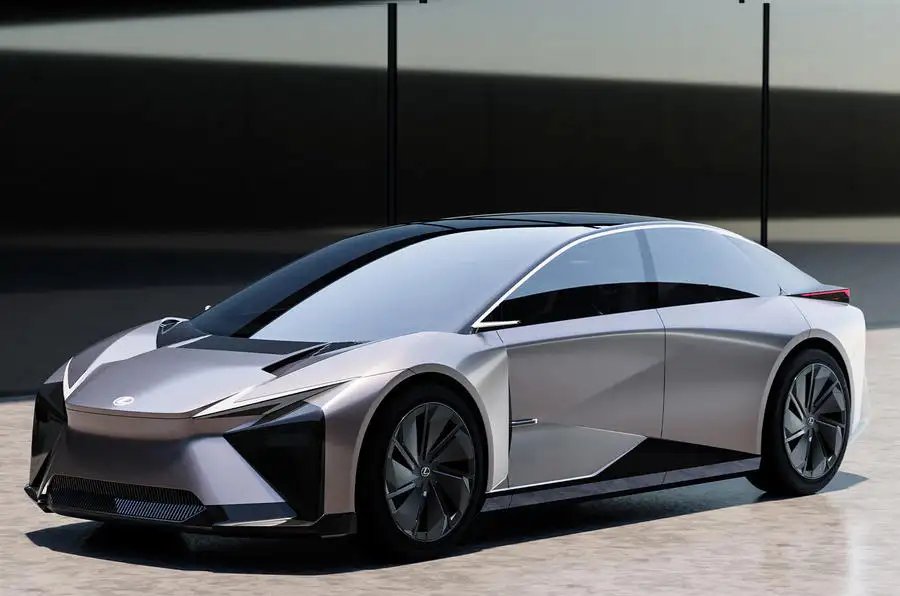New Lexus LF-ZC previews electric flagship with 998-km range

The new model is one of two EV concepts Toyota’s premium brand has unveiled at the Tokyo motor show. The other is the LF-ZL, which previews a future flagship SUV.
Both models carry the LF – Lexus Future – nameplate used by the firm for concept cars, along with the production LFA.
Lexus says the two models showcase its next generation of EVs, adding that the LF-ZC saloon “symbolises Lexus’s electrification journey” through its sleek design and a claimed focus on delivering “an exhilarating driving experience”.
The brand confirmed that the top-spec version of the production LF-ZC will offer a range of 621 miles (1000km), and that different variants with shorter ranges will also be available.
The concept is 4750mm long, 1880mm wide and 1390mm tall, with a wheelbase of 2890mm. That makes it around 200mm shorter but slightly wider than the Lexus ES, the smallest saloon the firm currently offers in the UK.
The LF-ZC features low-slung styling and an aero-optimised design that, Lexus claims, will allow for a drag coefficient of less than 0.2, which should in turn help to maximise efficiency and range.
The exterior design showcases the latest version of Lexus’s design language, with much of the focus given over to aerodynamic optimisation. The front end retains a version of the trademark Lexus ‘spindle’, while the flared rear wheel arches are designed to boost the machine’s stance.
Inside, there is a bold steering yoke for the driver, which reflects the use of the steer-by-wire system first employed on the Lexus RZ.
Meanwhile, the main controls have been spread across the cockpit area on a number of digital pads. The left pad is used for operation functions such as safety systems, driver assistance features and drive mode selections. Audio, climate control and other functions are grouped on the right.
There is also a ‘distant view meter’, which projects information onto the windscreen in a similar manner to a head-up display. Digital side mirrors are featured too and Lexus claims their use is intended to minimise shifts in the driver’s focus.
The front passenger gets an “ultra-wide” monitor that can be used to run infotainment and other apps.
The LF-ZC sits on a new common architecture that will underpin a wide range of future battery-electric models from Lexus and Toyota. It features next-generation prismatic batteries that, the firm claims, will offer improved energy efficiency.
The platform, which is shared with the Lexus LF-ZL, Toyota FT-3e and Toyota FT-Se, is also designed to be modular so that it will be suitable for different sizes and types of vehicles, as well as a range of different powertrain layouts. Lexus also claims that it has a number of weight-reduction design elements.
Using a process called ‘gigacasting’, Lexus claims the modular structure effectively divides the vehicle into three parts (front, centre and rear), which will give more freedom of form. There will also be increased integration of parts, which, the firm claims, will improve rigidity.
The batteries will be located in the centre section of the car, giving more freedom to the front and rear structures.
Lexus has given no technical details of the LF-ZC's powertrain, but it confirmed that it will be offered in single-motor, rear-wheel drive form. A dual-motor, four-wheel-drive model will also be available.
The firm says it is aiming to achieve “twice the range of conventional BEVs” through the use of the next-gen batteries and improved energy efficiency.
Lexus suggests the production version of the LF-ZC is likely to use the firm’s new Arene operating system, which, it claims, will have an “unprecedented effect” on driving dynamics by being able to replicate the driving characteristics of different types of car – in turn allowing the driver to alter the handing to suit their preferences.
This suggests that the production version of the LF-ZC could eventually be offered with the ‘manual’ EV transmission that Lexus is currently developing.
Related News


